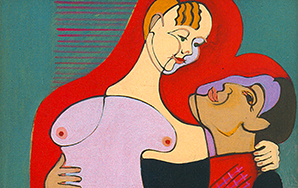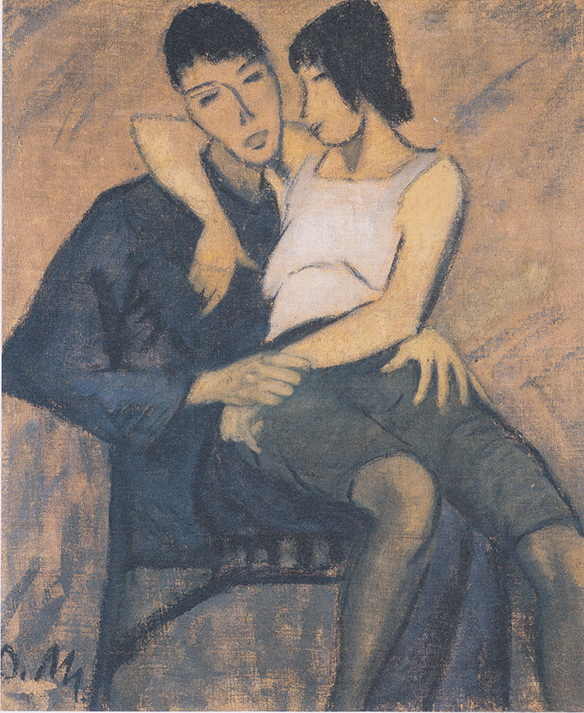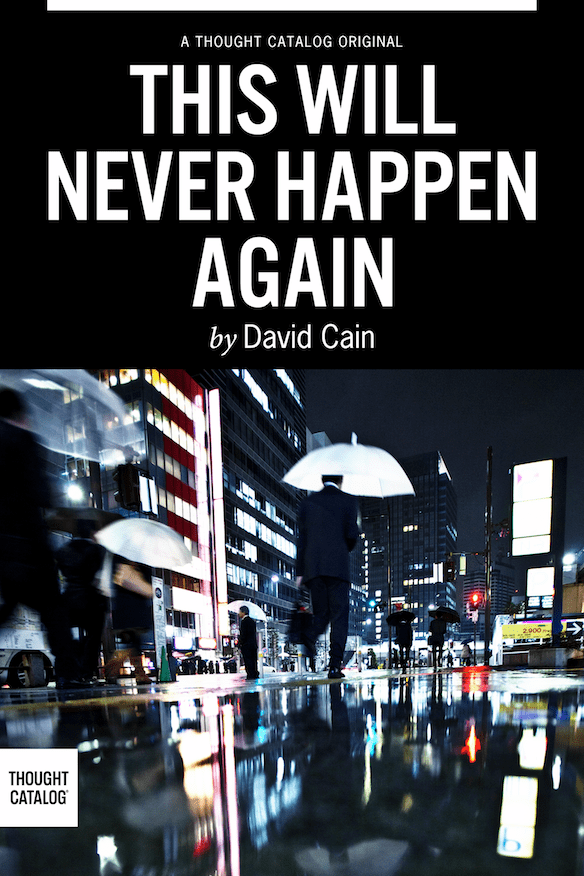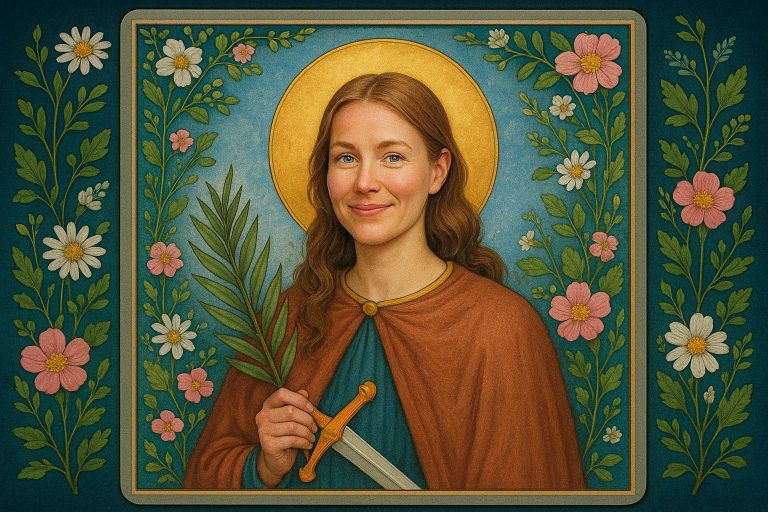
Why We F*ck
Out of all your sexual experiences, how often were you doing it simply because you wanted to make a baby? The vast majority of people use birth control. We try to minimize baby-making but we’re still highly interested in sex, and so for humans sex obviously serves another extremely compelling purpose.
By David Cain

A professional thinker named Thomas Hobbes got it into our heads for an embarrassingly long time that our ancestors were pitiful, lonely, mean people.
Three and a half centuries later Hobbes is still revered for his smarts, even though he’ll always be most famous for that unfortunate soundbyte in which he described the life of prehistoric man as “solitary, poor, nasty, brutish and short.”
Today few serious scientists are waving the “brutish and short” flag. Although the image of the paranoid, dumb, violent, solitary caveman persists in pop culture (and sometimes in our early blog posts) there’s little evidence to support it.
We now know human beings have always been highly social creatures, and that that has been our species’ defining strength. We know humans were nomadic for nearly all of their existence, roaming in groups of between 50 and 150 individuals. Rather than stressed, violent and solitary, they were probably most often calm, peaceful and intensely social.
Moving away from Hobbes’ thuggish caveman is one of those fabled “paradigm shifts” that happen sometimes in science, and which turn everything upside-down for a few decades (or centuries if there are churches involved,) until we’re mostly on the same page again — think Copernicus and his wild “the earth isn’t the center of the universe” idea.
As an interesting side-effect of rethinking what human quality of life was like in prehistory, it’s becoming clear that for all but the most recent sliver of human existence, human beings were not monogamous. Adults apparently didn’t pair off into exclusive couples like all of our storybooks tell us. They didn’t confine themselves to having children with only a single partner, as most people do (or try to do, or think they are supposed to try to do) today.
Our closest relatives, chimps and bonobos, are both highly “promiscuous” by the standards of today’s mainstream human society. Evolutionary psychologist and author Christopher Ryan, from his book Sex At Dawn:
If you spend time with the primates closest to human beings, you’ll see female chimps having intercourse dozens of times per day, with most or all of the willing males, and rampant bonobo group sex that leaves everyone relaxed and maintains intricate social networks.
Ryan has complied a mountain of evidence that makes it hard to find compelling reasons to continue to maintain that we are biologically geared for monogamy. It just doesn’t make a lot of sense. The only ape that demonstrates clearly monogamous behavior is the gibbon, a highly anti-social creature that lives in small nuclear families, estranged from other gibbons by their enormous territories. They have infrequent sex and do not appear to do it for fun.
Hobbes’s dismal vision of our ancestors has been famously debunked by all camps in the anthropology world, even if they have fiercely different opinions about other things. We know they probably didn’t live in highly competitive, scarcity-driven environments, and that they had more leisure time than we do.
And we know they had lots of hot sex. Probably more than you. They were definitely not the prudes that came about in recent centuries, bringing along chastity belts, religious meddling, and a shaming attitude towards sex.
Why did we have so much sex?
First of all, we still do. We just have more a lot more hangups about it. And it should surprise no one that the primary reason we do it is not procreation. We do it because it feels good physically and emotionally. More specifically, it allows us to share something super-intimate with another human being. Most of the time we are definitely, expressly not trying to make a child.
Out of all your sexual experiences, how often were you doing it simply because you wanted to make a baby? The vast majority of people use birth control. We try to minimize baby-making but we’re still highly interested in sex, and so for humans sex obviously serves another extremely compelling purpose.
That purpose is to bring us closer, to cement social bonds. Being big-brained and relatively weak-bodied — an 80-pound baboon can tear a 200-pound man to shreds — what kept humans alive for hundreds of thousands of years was that our interpersonal bonds were so tight.
What other species grieves so helplessly for so long when they lose a relative or companion? What other species requires a decade or two of constant attention in order to raise a child to be a healthy, independent individual? What other creature can lose track of itself completely by gazing into in the eyes of a close companion?
We bond intensely, perhaps like no other creature ever has. And sex, especially face-to-face, can create great peaks of intimate bonding. We lose our pretensions. In a hyper-intimate way we bare ourselves to another, our outer and inner selves at the same time.
Before “mine” and “yours”
Think about what it would be like to live your whole life in a social group of about a hundred people. You’d get to know everyone rather quickly, and would develop relationships with them over decades. Dissenters and troublemakers would be reformed quickly or shunned — jealous and possessive types would be too great a liability for the whole group.
Human beings have never been able to survive on their own. Even today the greatest human fear is being ostracized or abandoned, because for hundreds of thousands of years, it meant death. In the civilized world, where there’s always another job, always another circle of friends out there, rejection doesn’t mean death, but emotionally it remains a devastating experience for most of us.
Most notably, there would be no notion of private property, of “mine” versus “yours.” This can be observed in many of today’s remaining hunter-gatherer tribes, where hiding or hoarding anything is viewed as a glaring offense to the whole community.

Possessiveness would not be tolerated or even understood, and therefore the idea of sexual exclusivity would be just as absurd and offensive to the others as hoarding food. Clearly it is normal and healthy for human beings to be attracted to multiple people, and our ancestors wouldn’t have found many reasons to restrict their intimate activities to one mate.
Females each mating with multiple males means that no male could quite be sure which child was his genetically. There were no paternity tests, and everyone would be so closely related that there wouldn’t be too many giveaways in the child’s features, such as distinct hair color or eye color.
Think about what that means for a moment: it’s likely that for most of human existence, it was not normal for a man to know which kids were his.
For the survival of the group, this was a good thing. First of all, it meant that males wouldn’t kill off the children sired by other males (as some species do). But most importantly, it meant that every adult felt a responsibility to care for every child in the group. The females would breastfeed the children of other women, and no man would have any reason to view one child as “his” and another as “not his.” All children were vulnerable, all were in need of food and protection and love, and the survival of the group depended on the survival of children, no matter who fathered them. Paternal uncertainty, as biologists call it, kept hunter-gatherer groups well-bonded and more liable to survive than they would be if they were fragmented into nuclear families who had clear preferences about who ought to get most of the help.
So the result of a sexual culture that modern people might call “promiscuous” was that the whole group was one giant family, with a conspicuous lack of alienation, possessiveness and competition, compared to how we interact with each other today.
Why everything changed
Before our eyes, social norms are changing. Most people don’t gasp and whisper when they see interracial couples anymore. The US president has officially endorsed gay marriage. Hotels no longer insist that you be married to rent a hotel room with a member of the opposite sex. Normal changes, and it can change fast.
Monogamy is still accepted by most to be the “way things are” among human beings, as a general rule. Certainly it’s prescribed non-negotiably in the Bible and other religious texts. But human relationships reach back far longer than that.
About ten thousand years ago, people figured out how to stay put. Instead of roaming the country, foraging for food, they began to grow it themselves, in the same place year after year. This had several immediate, world-changing effects.
For the first time, people could stay in one place. Food could be stored and accumulated. Settlements became permanent. The population boomed, and people began to live closer together. Currencies were implemented. Social institutions formed: churches, laws, militaries.
For the first time, wealth could be hoarded. One person could amass many times the resources of another. There had never been a way for one person to become vastly more powerful than other person before, because nomad groups could only carry what they needed, and would seek newer pastures when resources dwindled. Excess was pointless.
But now, everyone saw that there was no limit to accumulation, and the more they accumulated, the more secure they were. So nobody ever felt like they quite had enough — it was always desirable to have more. Combine this to the skyrocketing population, and fierce competition for resources became the new norm.
This had to have completely changed the social dynamics between human beings, on all scales. Human existence quickly shifted from an environment of abundance to an environment of scarcity. Great imbalances of power and privilege began, whereas they were impossible before, and they have continued to widen for the last ten thousand years.
What does this have to do with sex?
The greatest change agriculture made was that particular people became tied to particular areas of land. The notion of ownership had become became crucial for the first time. If an individual wanted to survive, rather than contribute to a cohesive, self-contained group, he had to secure the right to work a particular area of land, probably in spite of the competing interests of others. He had to participate as a small part of a large, impersonal economy. His life depended on his ability to do that.
Much like today, when a landowner died others wanted the land, and the issue of who had legal claim to it had to be settled. The most intuitive arrangement was for a landowner’s offspring to inherit it.
So for the first time ever, it became absolutely necessary for a man to know that his children were his. In the age before birth control and paternity tests, there was only one way for a man to be certain:
He had to make 100 percent sure that his woman never, ever had sex with anyone else.
And so men came to control land by controlling women’s sexuality, and the new “normal” sculpted by this economic trend is still the primary model for us today: sexual monogamy. To secure themselves economically, men demanded virgins and had zero tolerance for any hint of non-monogamy. Fidelity was enforced by vicious social contracts including religious dictates and cultural beliefs, for which women were humiliated, stoned or worse for even expressing the desire to bed with another man.
This was the beginning of a culture of sexual inequality and repression that we are still, sadly, used to. Even in progressive societies, women who want to have many sexual partners are often regarded as sluts, by both sexes. Men don’t face the same scrutiny.
For centuries it was debated — among scholar-class men, of course — whether women derived any pleasure from sex at all. The academic consensus was that sex was a drive that pertained only to males, and was merely accomodated by married females so that they could have the only thing the women truly desired: children.
So monogamy appears to be a cultural phenomenon that has its origins in economics of all places. There isn’t necessarily anything instrinsically wrong with it, but looking at the divorce rates one can’t help but wonder whether it’s a round hole, while humans — biologically at least — carry square pegs.
It’s well known that in North America, most marriages end in divorce rather than death, and most marriages include sexual infidelity. Sexless marriages are common, if not commonly talked about.
We’re still recovering from long-standing, asinine cultural pressures that tell us we can’t have too many sexual partners, can’t be gay, can’t be single parents, can’t have group sex without becoming a weirdo or a hippie, can’t have two partners at once without being a cheat, and can’t decide not to have children without being a self-absorbed hedonist.
Thankfully Kinsey’s famous studies, released following the war, revealed to the world what it both feared and knew all along: that everybody was doing everything the whole time, they just hid it from view. People were having oral sex, anal sex, extramarital sex, group sex, sex with machinery, sex with their own hands and fingers, gay sex, dress-up sex, S&M sex, and sometimes, no sex at all.
The variety and volume of sexual tastes and practices were enormous in reality, but publicly everyone presented the same front: modest, God-fearing monogamous relationships.
Where normal comes from
The day we’re born, each of us opens our eyes and begins to build a world that seems “normal” to us. It is built from scratch, experience by experience, and what we build depends on the die roll of where we’re born and when. So what we come to regard as “the way things are” may only be the way things have been for a few centuries, or even a few decades, and only in our own locale.
We have a tendency to project our own “normal” backwards and forwards across time and across millions of other people’s lives, making a lot of people wrong in the process. The irony is that we refer to these relatively new practices and social rules — of which monogamy is only one — as “traditions,” and that any deviation from them is a betrayal of what’s natural. Ninety-nine percent of human existence occured before the “traditional” ways even began.
I know some people reading this have no idea where I’m going with this or why I’m picking on monogamy, but I know a lot of people out there are nodding their heads. There might be a very good reason why it’s been so damn hard to make things work the “traditional” way. What’s traditional in your culture might clash very strongly with your biological and emotional makeup.
I’ve been in relationships where I was expected never to audibly acknowledge that I find other women attractive. It was somehow wrong, offensive to my partner, to disclose this truth. Yet it’s the most basic and obvious truth of human sexuality — that we all feel desires for more than one person throughout our lives. Still, somehow, the normal perspective is that the right thing to do is to hide it from the person we are supposed to love most.
Think of how many people have suffered the most miserable ache in the heart, just because they did not accept that basic reality. If that’s normal, you may find it’s a good reason not to be normal. ![]()












